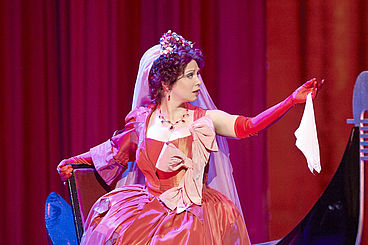
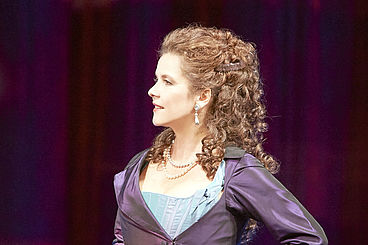
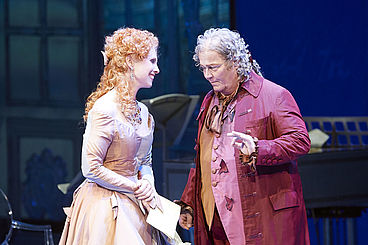 Richard Strauss’s Capriccio premiered in October 1942, at Bavarian State Opera in wartime Munich, authorised by Joseph Goebbel’s ministry. (1942 was the year of the Final Solution to the Jewish question; when Nazi Germany occupied most of Europe, and Japan the Far East.) Yet Strauss and librettist Clemens Krauss’s opera Capriccio, sub-titled “a conversation piece for music”, looks back to an idealised past – not unlike Strauss’s 1911 Der Rosenkavalier– in which a Countess, in a fairy tale palace, promotes and stages an opera.
Richard Strauss’s Capriccio premiered in October 1942, at Bavarian State Opera in wartime Munich, authorised by Joseph Goebbel’s ministry. (1942 was the year of the Final Solution to the Jewish question; when Nazi Germany occupied most of Europe, and Japan the Far East.) Yet Strauss and librettist Clemens Krauss’s opera Capriccio, sub-titled “a conversation piece for music”, looks back to an idealised past – not unlike Strauss’s 1911 Der Rosenkavalier– in which a Countess, in a fairy tale palace, promotes and stages an opera.
But Capriccio, originally described as ‘A theoretical comedy in One Act’, is both serious and entertaining. It raises the question whether opera is about words or music. So Flamand the composer (tenor Michael Schade) competes with poet Olivier (baritone Adrian Eröd) for the ‘love’ of the Countess. Capriccio is also about putting on an opera, so the director/impresario La Roche (Wolfgang Bankl), makes his case for opera as performance. But the divas Clairon (Angela Kirchschlager), the Italian opera buffo singers and the dance troupe keep interrupting the action, as they put on a mini-opera- like a ‘Noises Off’. And subversively, the Count, Madeleine’s brother, suggests, they be the subject of the opera, the opera dealing with a day in their lives. Thus Strauss’s last staged opera is a tribute to opera, as if he’s looking back, with fondness and fury, at a lifetime in opera.
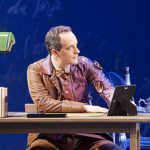 This marvelous Vienna State Opera production, directed, stage design and lighting by Marco Arturo Marelli, is celebrating its tenth (2008) anniversary. The Prologue opens to a sombre septet, reminiscent of Strauss’s Metamorphosen, Vienna State Opera Orchestra’s minimalist strings conducted by Michael Boder. On opposite sides of the stage sit at their desks, left Olivier, Eröd’s poet, behind him magnified pages of a blotched, corrected manuscript; to his right Schade (blown-up) musical score behind him . They engage in polemical debate, scoring points for their ‘Muse’. Does the music, or the text take precedence, prima la musica dopo e poi le parole , or vice versa? Both are vying for her patronage, both in love with the Countess. Both await the Countess’s decision: but the Countess can’t decide.
This marvelous Vienna State Opera production, directed, stage design and lighting by Marco Arturo Marelli, is celebrating its tenth (2008) anniversary. The Prologue opens to a sombre septet, reminiscent of Strauss’s Metamorphosen, Vienna State Opera Orchestra’s minimalist strings conducted by Michael Boder. On opposite sides of the stage sit at their desks, left Olivier, Eröd’s poet, behind him magnified pages of a blotched, corrected manuscript; to his right Schade (blown-up) musical score behind him . They engage in polemical debate, scoring points for their ‘Muse’. Does the music, or the text take precedence, prima la musica dopo e poi le parole , or vice versa? Both are vying for her patronage, both in love with the Countess. Both await the Countess’s decision: but the Countess can’t decide.
As the Countess Madeleine, Anna Gabler (who debuted with Bavarian State Opera) is young and beautiful. But how can she eclipse memories of Renée Fleming, who from the 2008 premier here, made the role her own? Well Gabler is bubbly, vivacious, her soprano light and ethereal, has a high register. Gabler, her auburn hair coiffed in loose ringlets, has glamour and authoritative stage presence.
Eröd and Schade have long inhabited their respective roles, Schade here as Flamand since 2008. Against Eröd’s fine baritone, Schade’s exquisite tenor is especially sweet-voiced arguing his case, doesn’t language carry song in it; 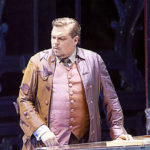 while he movingly declaims his love, his love born in the Countess’s library. (She didn’t see him behind his book.) Decide, music or poetry!
while he movingly declaims his love, his love born in the Countess’s library. (She didn’t see him behind his book.) Decide, music or poetry!
Of the other other stars in smaller roles, Angelika Kirchschlager, a tempest of energy, her boundless charisma, even outshines her languid aristocratic patron. In the Italian gondolier scene – to humorously illustrate the excesses of Italian belcanto singing- Daniela Fally, in a scarlet dress, displayed stunning coloratura.
The whole stage erupts with the cast of the staged opera-within-an-opera all putting up their own ideas. Yet it’s a masterclass in ensemble singing; and, immaculately choreographed chaos (Vienna State Ballet dancers.) In a billowing, richly colourful, orange outfit veteran bass Wolfgang Bankl as La Roche, in his aria, upholds the role of art, the art of our forefathers, and anticipating the new, in arguing for the importance of theatre. Fill the stage with mankind: theatre is a catharsis for our suffering. He sings movingly, requesting as his epitaph; Here lies La Roche , the unforgettable theatre director for eternity.
Meanwhile ,the Count, Madeleine’s brother, (Morten Frank Larsen), mischievously proposes the plot of the ‘opera’ should be the past day’s events, even the heated discussions over Prima le parole the words or music debate. Write an opera for our time. In the theatrical space, time stops while the world is getting older.
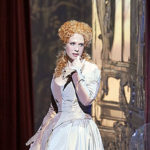 The Countess is in love , but doesn’t know with whom. (Die Grafin ist verliebt, aber weiss nicht in wem.) In Madeleine’s extended aria, like the Marshallin’s closing scene in Der Rosenkavalier, the heart of the opera, Anna Gabel holds the stage with sovereign authority. The set resembles a crystal palace- rococo mirrored panels, chandeliers. Madeleine stands perusing the scores, leaning on her antique desk. She’s left alone; her brother has left town, accompanied by Clairon. There are baskets of flowers centre stage. Momentary happiness. Is it the words that move her more than the music. Olivier, or Flamand, who does her heart beat for? Music and poetry are zueinander verbunden ; each lives in the other, and each seeks the other. How should she decide. In her soliloquy, Now dear Madeleine, you are loved: you find it sweet, endearing. But if she chooses one , she loses the other. Doesn’t one always lose when one wins? Gabel- without, say, Fleming’s experience, in a part she has mellowed into- is nevertheless confident in this dream role. Of course, vocally, her soprano, like young wine, lacks those complex rich notes; or exceptional power. Yet it’s beautifully sung.
The Countess is in love , but doesn’t know with whom. (Die Grafin ist verliebt, aber weiss nicht in wem.) In Madeleine’s extended aria, like the Marshallin’s closing scene in Der Rosenkavalier, the heart of the opera, Anna Gabel holds the stage with sovereign authority. The set resembles a crystal palace- rococo mirrored panels, chandeliers. Madeleine stands perusing the scores, leaning on her antique desk. She’s left alone; her brother has left town, accompanied by Clairon. There are baskets of flowers centre stage. Momentary happiness. Is it the words that move her more than the music. Olivier, or Flamand, who does her heart beat for? Music and poetry are zueinander verbunden ; each lives in the other, and each seeks the other. How should she decide. In her soliloquy, Now dear Madeleine, you are loved: you find it sweet, endearing. But if she chooses one , she loses the other. Doesn’t one always lose when one wins? Gabel- without, say, Fleming’s experience, in a part she has mellowed into- is nevertheless confident in this dream role. Of course, vocally, her soprano, like young wine, lacks those complex rich notes; or exceptional power. Yet it’s beautifully sung.
The Countess’s monologue ends in enigma. Is there one (an ending) that isn’t trivial? Strauss/Krauss’s Gibt es einer, der nicht trivial ist? is like an Oscar Wilde epigram. A liveried servant appears: Frau Grafin, die Soupe ist serviert (Countess, soup is served.)
Eröd’s Olivier and Schade’s Flamand go back to their desks, as the stage curtain falls, just as the opera began. The big question as to the nature of opera -still unresolved.
Thankfully Marelli’s exemplary Vienna State Opera production is still there to convinces us that – in spite of its checkered past, its unworthy origins- Strauss’s opera -for it is opera -is too great to be passed over. © PR 20.5.2018
Photos: Daniela Fally (Italian Singer); Angela Kirchsclager (Clairon) ; Anna Gabler (Countess) and Wolfgang Bankl (La Roche); Adrian Eröd (Olivier) ; Michael Schade (Flamand); Anna Gabler (Countess)
© Wiener Staatsoper/ Michael Pöhn

I have recently started a blog, the information you provide on this web site has helped me tremendously. Thanks for all of your time & work.
Hello. magnificent job. I did not expect this. This is a fantastic story. Thanks!
Hello, you used to write fantastic, but the last several posts have been kinda boring… I miss your super writings. Past several posts are just a little out of track! come on!
Admiring the hard work you put into your website and in depth information you present. It’s good to come across a blog every once in a while that isn’t the same old rehashed material. Fantastic read! I’ve bookmarked your site and I’m including your RSS feeds to my Google account.
WONDERFUL Post.thanks for share.
Hi there! I’m at work surfing around your blog from my new iphone 4! Just wanted to say I love reading your blog and look forward to all your posts! Carry on the excellent work!
Hi! I’m at work surfing around your blog from my new apple iphone! Just wanted to say I love reading through your blog and look forward to all your posts! Keep up the great work!
Howdy! This is my first comment here so I just wanted to give a quick shout out and say I truly enjoy reading through your posts. Can you recommend any other blogs/websites/forums that cover the same subjects? Thanks!
I have recently started a blog, the info you provide on this web site has helped me greatly. Thank you for all of your time & work.
I used to be very pleased to seek out this web-site.I wished to thanks in your time for this glorious read!! I undoubtedly enjoying each little little bit of it and I’ve you bookmarked to take a look at new stuff you blog post.
Very nice post. I just stumbled upon your weblog and wished to say that I have truly enjoyed browsing your blog posts. In any case I’ll be subscribing to your feed and I hope you write again very soon!
Hey! I’m at work browsing your blog from my new iphone 4! Just wanted to say I love reading through your blog and look forward to all your posts! Carry on the fantastic work!
Just wish to say your article is as amazing. The clearness to your post is simply great and i could think you are an expert in this subject. Fine together with your permission allow me to grasp your RSS feed to keep up to date .